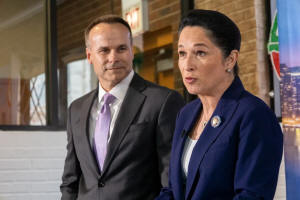Comptroller Mendoza won’t run for reelection, opening up statewide
office
[July 17, 2025]
By Andrew Adams
CHICAGO — After almost a decade, Illinois State Comptroller Susana
Mendoza will not seek another term as the state’s chief financial
officer.
Mendoza, who took office in December 2016 after beating an ally of
Republican Gov. Bruce Rauner in a special election, has overseen the
state’s financial systems through both the COVID-19 pandemic and the
worst budget crisis any state has faced in modern history.
At a news conference Wednesday, Mendoza said she’s not running for
reelection in the 2026 comptroller’s race, so she will have time to
decide her next career move.
“I’m going to figure out what the right move is for our family, for our
city, our state, find out where I’m needed most, that next biggest
challenge that I need to take on,” Mendoza said.
Prior to taking statewide office, Mendoza was the first woman to be the
Chicago City Clerk. Mendoza previously spent a decade in the Illinois
House of Representatives.
It’s been widely speculated that Mendoza, who ran for Chicago mayor in
2019, is eyeing a run to unseat sitting Chicago Mayor Brandon Johnson in
2027.
While she didn’t commit to a run, she said she is “leaving the door
open.” Several U.S. House seats are up for grabs, along with Illinois’
first open U.S. Senate seat since 2010.
But when asked whether she was interested in a position in Congress,
Mendoza laughed.
“No thank you,” she quickly said Thursday, before moving on to questions
about a potential mayoral bid.

Comptroller vacancy
The comptroller’s office, traditionally a low-visibility role, became a
high-stakes proxy battle between Democratic and Republican power brokers
during the budget impasse of the mid-2010s.
Mendoza became the most vocal and high-profile statewide Democratic foil
to Republicans at the height of the more than two-year budget impasse
between Rauner and Democrats in the General Assembly. After Comptroller
Judy Baar Topinka died in 2014, Rauner appointed Leslie Munger to the
position. Mendoza beat Munger with 49.5% of the vote in a special
election in 2016.
Mendoza gained statewide visibility for her frequent videos assailing
Rauner and highlighting that the state was accruing a massive “bill
backlog” driven by ongoing court-mandated expenditures amid dwindling
revenue brought on by the impasse.
She won reelection in 2018 and 2022, routinely posting the widest
margins of any statewide elected official.
No Republican, meanwhile, has won statewide office since Rauner in 2014,
and few have come especially close. This puts the focus for replacing
Mendoza on the Democratic primary process. The announcement creates an
opportunity for a new Democrat to make a run for an open statewide
office for the first time since 2018.
Mendoza said she wanted to make the announcement early enough for people
interested in replacing her to “make their pitches” to party officials.
The Cook County Democratic Party — a powerhouse in statewide party
politics — is holding its “slating” meetings this week to decide which
candidates the party will endorse.
Rep. Margaret Croke, D-Chicago, is expected to appear at the slating for
statewide candidates and make a formal announcement about her 2026 plans
next week, according to sources close to the representative.

[to top of second column]
|

Illinois Comptroller Susana Mendoza announces she will not seek
reelection alongside her husband David Szostak. (Capitol News
Illinois photo by Andrew Adams)

“With chaos unfolding at the national level, Illinoisans need steady
state leadership and deserve a Comptroller who is prepared to lead with
transparency, efficiency, and integrity,” Croke said in a statement
after Mendoza’s announcement.
Lake County Treasurer Holly Kim is also expected to appear at the Cook
County slating meeting, with an announcement about her plans in the
coming weeks.
“Susana Mendoza raised the bar for transparency and accountability, and
I intend to build on that legacy,” Kim said.
Sen. Javier Cervantes, D-Chicago, is also scheduled to appear at the
slating meeting to discuss a potential comptroller bid.
Mendoza said she hopes her replacement is committed to serving the
entire state, noting that while she is a Chicagoan, she said she has a
“very soft spot in my heart for southern Illinois.”
Mayoral ambitions
While Mendoza did not commit to a run for mayor, she did speak at length
about the needs of the city.
“Chicago is in dire need of competency, someone who understands the
needs of the city, who understands how important the role of the city is
to the good functioning of the whole state,” Mendoza said. “And I think
we’ve had two very unsuccessful mayors in a row.”
Mendoza stressed public safety and Chicago’s need for a growth-centered
economic policy.
“It’s not just our feathered friends that have flown south, it’s the
most important bird in Chicago: the crane,” Mendoza said. “You can look
at a city and gauge its financial health by the number of cranes that
are in the sky. And, right now, you have an unobstructed,
picture-perfect view of this city.”
If she runs, Mendoza could be joined by several other prominent Illinois
politicians in the race for mayor. Illinois Secretary of State Alexi
Giannoulias is also rumored to be considering a run.

Mendoza made her announcement at Los Comales, a restaurant in Chicago’s
Little Village neighborhood that specializes in Mexico City-style tacos.
Christina Gonzalez, the co-owner of the Los Comales chain and daughter
of its founder, noted that Mendoza was from the neighborhood.
“She was always a customer here,” Gonzalez said. “Her parents brought
her here and she knew my dad — my dad loved her.”
It’s the same restaurant where she announced her first run for state
representative more than 20 years ago and her ill-fated mayoral bid in
2019.
Gonzalez said the restaurant, which was mostly empty aside from
Mendoza’s supporters and reporters, has faced a significant slowdown in
business recently, thanks to rumors about immigration enforcement.
Capitol News Illinois is
a nonprofit, nonpartisan news service that distributes state government
coverage to hundreds of news outlets statewide. It is funded primarily
by the Illinois Press Foundation and the Robert R. McCormick Foundation. |